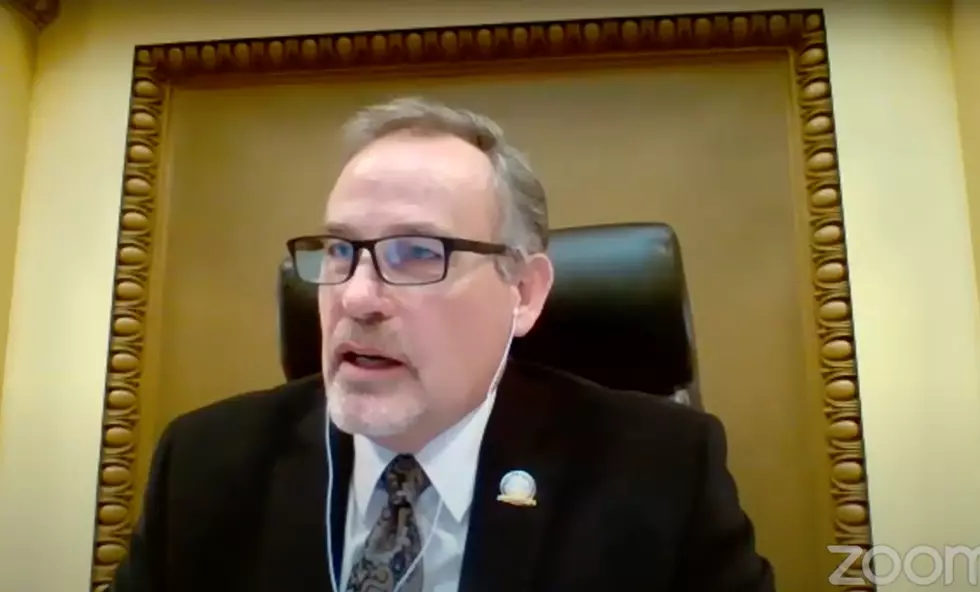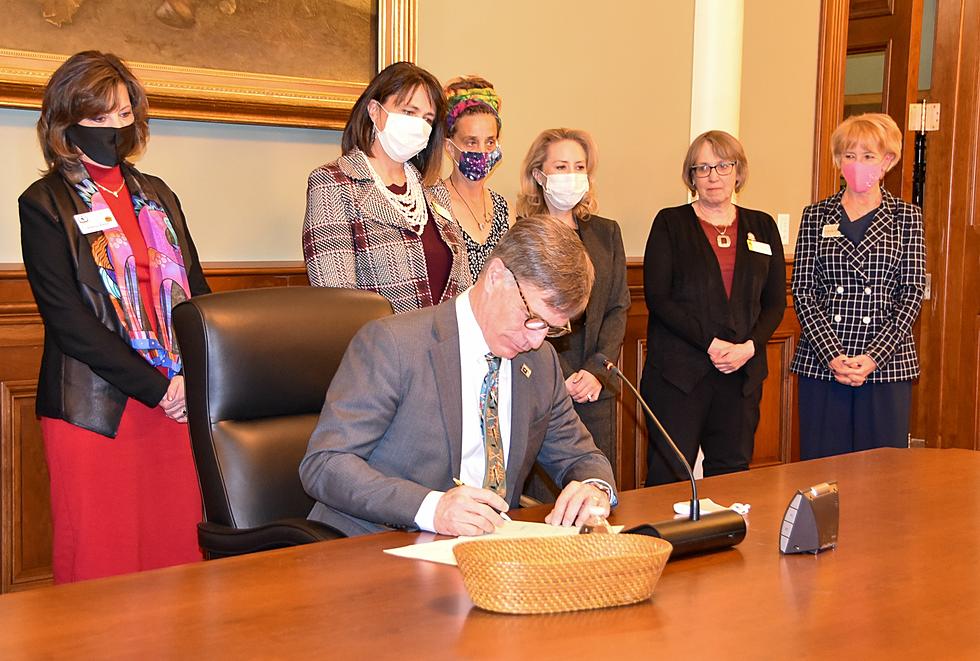
WATCH: Governor Gordon Honors Casper Student for Wyoming Wildlife Essay
Each year, more than 6,000 big game animals die from collisions with vehicles on Wyoming's highways and insterstates, according to the Wildlife Crossings Work website. Because of this, in 2020, Governor Mark Gordon challenged Wyoming citizens to purchase wildlife conservation license plates as part of the Game and Fish Wildlife Crossing Initiative.
Funds generated from the Conservation Plate go towards helping fund overpasses, underpasses, fencing and signage to prevent vehicle and animal collisions.
To raise awareness about these new plates, The Greater Yellowstone Coalition, the Muley Fanatic Foundation, The Nature Conservancy, The WYldlife Fund, and the Wyoming Wildlife Federation came together and combined resources to host a competition that would award an individual, aged 17-27 a free Wyoming Conservation License Plate.
The winner of the competition was 18-year-old Ryan Loghry. Loghry is a freshman at Casper College, working towards an Associates Degree in Wildlife and Fisheries Bilogy and Management.
Loghry penned an essay for the Wildlife Crossings Work website, and it was that essay that won the competition, which earned him a free plate that was awarded to him by Governor Gordon on Tuesday, June 8, 2021 at the Oil and Gas Commission building in Casper.
"I heard about the competition through Instagram," Loghry stated. "I follow the Wyoming Wildlife Game and Fish and I saw the post [about the competition] and I thought that could be interesting. I kind of thought it was a shot in the dark for me, but I just started writing some stuff and it turned out to work for me."
Loghry said that his essay focused on the idea that conservation is a huge part of the identity of Wyoming.
"I took some inspiration from [a poet named] Aldo Leopold and his writing in the Sand County Almanac, a book about conservation. There's a quote in the book that says 'Some people can live without wild things and some cannot.' So I took that as the basis for my essay and wrote about how Wyoming can't live without our wildlife because it's in our blood. You can't have Wyoming without wildlife."
Loghry said that when he grows up, he would like to possibly work for the Game and Fish Department as a biologist but, he said, he would to stay close to home..
"I'd like to stay in Wyoming because there's so much to offer" he said.
Loghry said that he was surprised that he won the competition, especially when he found out he'd be meeting the governor.
"I was pretty shocked," he said. "But I felt pretty honored because [wildlife conservation] is something that I really care about. It's pretty astonishing for me. For me to be chosen for this; it's just really special."
Governor Gordon held court with Loghry after presenting him with the 2020 license plate he had won, asking the young man about his plans for the future and encouraging him to follow his dreams.
Gordon also said that Wyoming doesn't get nearly enough recognition for the effort it puts into wildlife conservation.
"This is extraordinary," Governor Gordon told Loghry. "What a remarkable essay and I look forward to seeing these plates on cars all around the state [but] more than that, I'm hopeful that you will pursue a career wildlife."
Governor Gordon continued, saying that "It was always interesting to me that, nationally, we don't get recognized for really pioneering the [wildlife conservation] work that's being done here in Wyoming, so it's really an honor to have a Wyoming young, budding scientist stepping forward to really lead that effort."
Here is a video of the Governor awarding the plates to Loghry, and his essay can be read below.
“There are some who can live without wild things and some who cannot.” This statement by the great conservationist Aldo Leopold is a precise illustration of the conservation ethic of wildlife in Wyoming. There are some who can live without the deep bugle of an elk on a cool September morning. Wyoming cannot. There are some who can live without the long, chattering calls of sandhill cranes floating gently overhead. Wyoming cannot. There are even some who can live without the carefree frolicking of newborn pronghorn. Wyoming cannot. The native wildlife of Wyoming is the bloodline of our state, the state and its wildlife are one and the same. The conservation of our Wildlife is paramount, because we are not only conserving animals, we are conserving the entire identity of our state.
Wyoming has a rich history of hunting and fishing, and before conservation became a reality, that history dangerously encroached on ecological devastation. Through conservation, that complete devastation was narrowly prevented. Today, hunting and fishing are the backbone of wildlife conservation. The millions of revenue from licenses are used in conservation efforts. Each license is important to help prevent ecological collapse. Hunting and fishing are always at the center of attention, typically, game species are behind the largest conservation efforts in the state. This conservation is important, without the conservation of mule deer, there will be no mule deer to hunt, and without mule deer, there will be no funds for conservation. Conservation and hunting are closely tied, always relying on one another. Conservation is not exclusively tied to game species however, every native species is an important part of Wyoming’s identity. We are conserving our identity through the conservation of wildlife.
Although pronghorn and elk may provide our state a large monetary merit, they are no more important to our identity than the Wyoming toad, or the swift fox. Conservation is not only vital for the self-preservation of an identity, but it is imperative for every person in the United States, and even for every person in the world. Wyoming is privileged to have the chance to give a home to each species within our borders. Where else in the world do you get the opportunity to view grizzly bears and wolves, bighorn sheep and bobcats, black-footed ferrets and bison. The answer is nowhere. Very few people in the world will be able to witness a moose grazing on willows, even fewer will witness the Wyoming pocket gopher emerging from its burrow. It is Wyoming’s responsibility to conserve our wildlife, not only for the benefit of Wyomingites, but for the benefit of every person on earth who could even imagine Wyoming’s wildlife. Conservation is not limited to hunters, biologists, anglers, or wardens. Conservation is universal, every person that inhabits Earth can be a conservationist. For every Wyomingite, conservation is essential, without it, we lose part of our identity.
There are some who can live without the osprey, plunging into cold water in search of a cutthroat trout. Wyoming cannot. There are some who can live without the shrill warning cries of the black-tailed prairie dog. Wyoming cannot. There are some who can live without wildlife. Wyoming cannot."
A Field Guide To Wyoming Tourist Types
More From 104.7 KISS-FM









